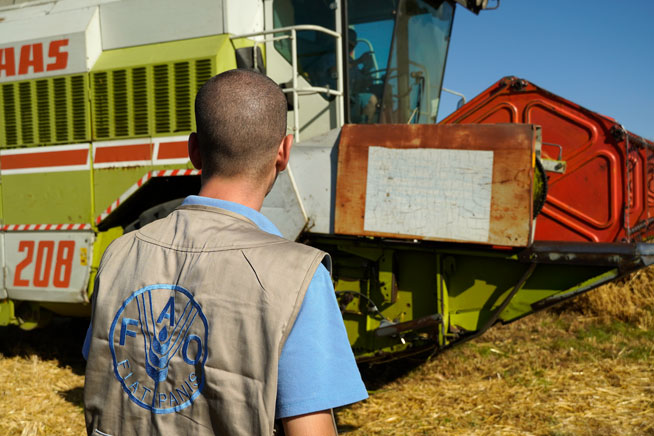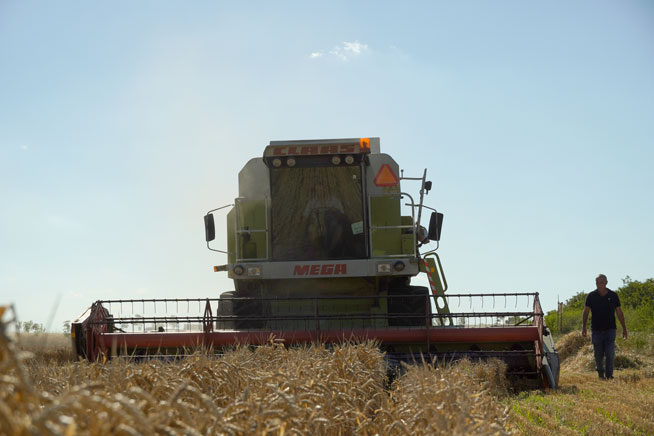FAO Celebrates the Grain Harvest with Conflict-Affected Smallholder Farmers in Shida Kartli

In July 2023, FAO Georgia celebrated the harvest of cereals with the farmers from the conflict-affected farming communities from Shida Kartli, who have successfully implemented the no-till farming methodology of conservation agriculture, through the support of the Czech Development Cooperation (Czech Dvp Cooperation).
FAO has supported more than 80 grain farmers living near the administrative borderline (ABL) of Tskhinvali Region/South Ossetia, Georgia. The Organization provides them with training on conservation agriculture and access to no-till sowing machinery. The equipment has already been used to seed grains on 261 hectares of land in the region.
Using the modern aggregate to implement the conservation agriculture concept, results in a reduction of around 35 percent of the production costs, and farmers’ time, thus supporting the economic resilience of conflict-affected communities in Shida Kartli. Importantly, no-till farming is an environmentally sustainable solution to the agricultural challenges, such as droughts and soil erosion, in this region, especially in light of the climate change.


Saved Money, Saved Time
The no-till planting method is economically beneficial because it reduces around a 35 percent of fuel and mechanisation costs since this practice does not require ploughing and disking in the field. Hence, the conservation agriculture method allows farmers from the conflict-affected rural communities from Shida Kartli to improve their economic resilience. They have been able to save money on renting machinery, workforce, and purchasing fuel.
Moreover, by getting to the seeding phase without turning over the soil, farmers save time, which makes it possible for them to devote more time to other agricultural practices. Notably, they also become less dependent on weather and hence more capable of ensuring that the seeding phase takes place in a timely manner.
The main bottleneck of this technique is the lack of no-till planters in Georgia, and this is why the Czech Dvp Cooperation and FAO have joined forces to facilitate access to these aggregates for farmers that are interested in trying new, innovative practices.

Environmental Sustainability for Improved Resilience
Fields that are cultivated with the no-till farming technique are much more resilient to droughts due to the increased water holding capacity of the soil. The residues from the previous harvest create a natural mulching on its surface, improving its the resilience toward wind and rainfall erosions. This way, the soil can also better adjust to excessive rain and reduce the impact of floods.
As a result, no-till farming methodology can make farmers more resilient toward external, environmental risk factors. By utilizing FAO’s no-till planters and integrating the conservation agriculture practices in their agricultural work, the conflict-affected rural communities in Shida Kartli have been able to reduce the environmental risks while also reducing costs and maintaining or, in some cases, increasing their yields.

Quotes
“Today is an important day for FAO and the farmers we work with. We are celebrating the cereal harvest season. FAO and Czech Dvp Cooperation are working with hundreds of cereal farmers, as well as dairy producers and beekeepers living near the ABL of Tskhinvali Region/South Ossetia, Georgia. Access to technical knowledge and technologies is proving to be an important factor in empowering local farmers and increasing their resilience in conflict affected regions, which are now also affected by the climate change. Small and simple practices such as no-till planting, as well as training modules of our FAO agronomists, can do a lot to provide tangible results and make agriculture more sustainable, improving community resilience,” says Javier Sanz Alvarez, FAO Programme Coordinator.
“I think that this project is a great example of how small interventions and well-targeted trainings can have a great impact on populations. Moreover, it´s regional focus on the ABL with South Ossetia has a very positive social impact, as the trainings bring together the local farmers, most of whom are women, and this new social network supports, in general, the resilience of local communities. I am pleased that Czechia has been supporting this project with clear and positive outcomes,” says Jana Zelingerová – Head of Development Cooperation, Czech Embassy in Tbilisi.
___
With a focus on smallholder women farmers, the main objective of the Czech Dvp Cooperation-supported project is to work with the conflict-affected rural communities living near the ABL of the Tskhinvali region/South Ossetia, Georgia and to showcase to them some of the impactful methods for increasing the farmers’ resilience.
